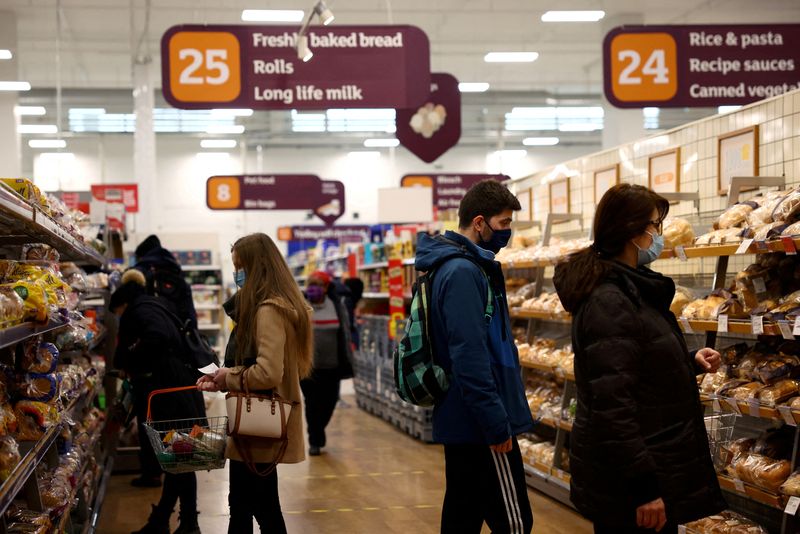By David Milliken and Andy Bruce
LONDON (Reuters) -British inflation surged to its highest in more than 10 years in November, jumping to 5.1% and potentially unsettling the Bank of England a day before it announces whether it is raising interest rates for the first time since COVID-19 struck.
Price pressure from a broad range of consumer goods and services - but especially petrol, clothing and footwear - lay behind the increase in inflation to its highest since September 2011, the Office for National Statistics (ONS) said.
The reading exceeded all forecasts in a Reuters poll of economists, which had pointed to a rise of 4.7% from October's 4.2%.
Last month the BoE, which announces its December policy decision on Thursday, had predicted consumer price inflation - just 0.7% at the start of 2021 - would peak at around 5% next April, when regulated household energy bills increase.
Inflation has soared globally this year due to higher energy prices and COVID-related supply-chain bottlenecks. In Britain, post-Brexit trade and migration barriers have also caused problems.
The BoE has said interest rates will almost certainly need to rise to bring down inflation pressures, but held off on a widely expected move last month due to uncertainty about the impact of the end of the government's job furlough programme.
Many economists still expect the BoE to stay on hold again on Thursday, because of the potential impact on economic growth of rapidly rising cases of the Omicron coronavirus variant, despite the inflation surprise.
"Under usual circumstances, it would be consistent with an imminent rate rise," said HSBC economist Chris Hare. On balance, Omicron headwinds pointed to no rise on Thursday. "But the decision is not a straightforward one by any means," he added.
INFLATION IN ACTION
The International Monetary Fund - which predicts British inflation will hit a 30-year high of 5.5% next year - on Tuesday urged the BoE not to succumb to "inaction bias".
However, any immediate rise in borrowing costs would do little to curb a short-term rise in inflation.
Samuel Tombs, chief economist at Pantheon Macroeconomics, said it could reach 6% next April but fall rapidly thereafter and undershoot the BoE's 2% target in 2023.
Market reaction to Wednesday's data was initially muted. Sterling rose modestly against the dollar and the euro, and interest-rate sensitive two-year gilt yields hit a one-week high.
Interest rate futures now price in a 63% chance of a rate rise on Thursday - compared with below 50% on Wednesday, and see a slightly faster pace of tightening in 2022.
A rate rise to 0.25% from 0.1% was already fully priced in for February, which would make the BoE the first of the world's major central banks to increase interest rates since the start of the COVID-19 pandemic.

Wednesday's data showed core consumer price inflation, which excludes more volatile energy, food, alcohol and tobacco prices, rose to 4.0% from October's 3.4%, its highest since 1992. Fuel prices rose 28.5%.
The retail price inflation (RPI) measure - used for inflation-linked government bonds and wage-bargaining but which the ONS says is no longer accurate - rose to 7.1% from 6.0%, its highest since March 1991.
